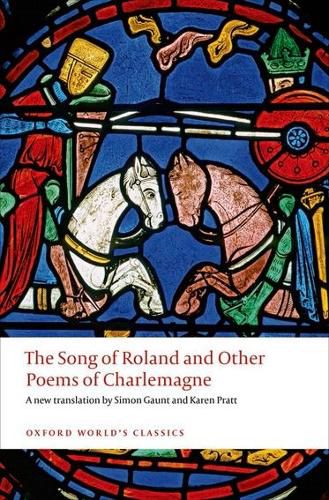Readings Newsletter
Become a Readings Member to make your shopping experience even easier.
Sign in or sign up for free!
You’re not far away from qualifying for FREE standard shipping within Australia
You’ve qualified for FREE standard shipping within Australia
The cart is loading…






Charles the king, our emperor great,Has been a full seven years in Spain.As far as the sea he conquered this haughty land.Not a single castle remains standing in his pathCharlemagne (768-814) was crowned Holy Roman Emperor in 800 and presided over a huge empire. He frequently appears in literature as a great warlord and pious crusading figure. In 778, the rearguard of Charlemagne’s retreating army was ambushed and defeated at the battle of Roncevaux. This became the inspiration for songs and poems celebrating deeds of valour in the face of overwhelming odds, through the character of Charlemagne’s nephew (the imaginary) Roland. The Song of Roland is the most stirring and moving epic poem of the European Middle Ages, offering a particularly heady mixture of history, legend, and poetry. Presented here in a lively and idiomatic new translation, the Song of Roland offers fascinating insights into medieval ideas about heroism, manhood, religion, race, and nationhood which were foundational for modern European culture. The Song of Roland is accompanied here by two other medieval French epics about Charlemagne, both of which show him to be a far more equivocal figure than that portrayed by the Roland: the Occitan Daurel and Beton, in which he is a corrupt and avaricious monarch; and the Journey of Charlemagne to Jerusalem and Constantinople, which gives the heroes of the Roland a comic makeover.
$9.00 standard shipping within Australia
FREE standard shipping within Australia for orders over $100.00
Express & International shipping calculated at checkout
Charles the king, our emperor great,Has been a full seven years in Spain.As far as the sea he conquered this haughty land.Not a single castle remains standing in his pathCharlemagne (768-814) was crowned Holy Roman Emperor in 800 and presided over a huge empire. He frequently appears in literature as a great warlord and pious crusading figure. In 778, the rearguard of Charlemagne’s retreating army was ambushed and defeated at the battle of Roncevaux. This became the inspiration for songs and poems celebrating deeds of valour in the face of overwhelming odds, through the character of Charlemagne’s nephew (the imaginary) Roland. The Song of Roland is the most stirring and moving epic poem of the European Middle Ages, offering a particularly heady mixture of history, legend, and poetry. Presented here in a lively and idiomatic new translation, the Song of Roland offers fascinating insights into medieval ideas about heroism, manhood, religion, race, and nationhood which were foundational for modern European culture. The Song of Roland is accompanied here by two other medieval French epics about Charlemagne, both of which show him to be a far more equivocal figure than that portrayed by the Roland: the Occitan Daurel and Beton, in which he is a corrupt and avaricious monarch; and the Journey of Charlemagne to Jerusalem and Constantinople, which gives the heroes of the Roland a comic makeover.